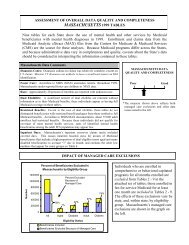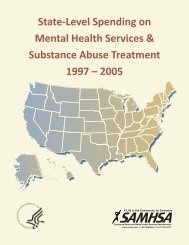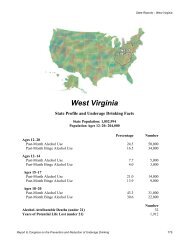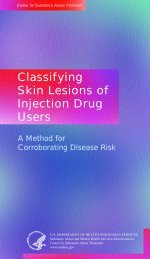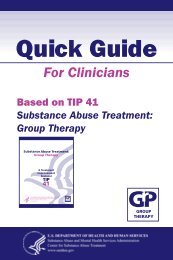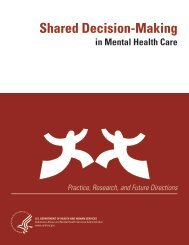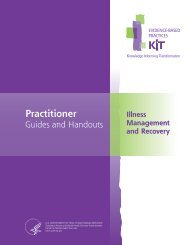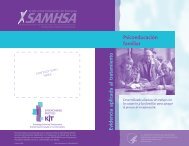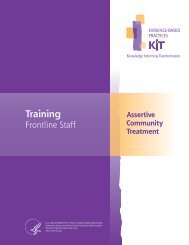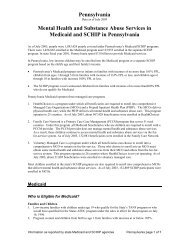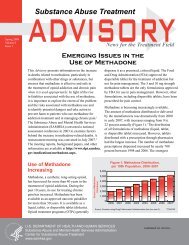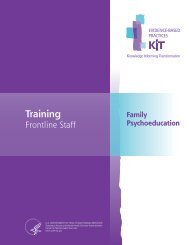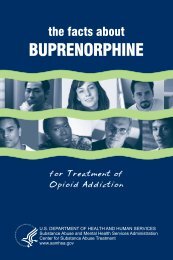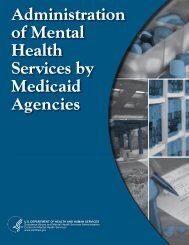TAP 21 - SAMHSA Store - Substance Abuse and Mental Health ...
TAP 21 - SAMHSA Store - Substance Abuse and Mental Health ...
TAP 21 - SAMHSA Store - Substance Abuse and Mental Health ...
Create successful ePaper yourself
Turn your PDF publications into a flip-book with our unique Google optimized e-Paper software.
PD VIII. Professional <strong>and</strong> Ethical Responsibilities<br />
Competency 118:<br />
Recognize the importance of individual differences that influence client<br />
behavior, <strong>and</strong> apply this underst<strong>and</strong>ing to clinical practice.<br />
Knowledge<br />
uX Differences found in diverse populations.<br />
u How individual differences affect<br />
assessment <strong>and</strong> response to treatment.<br />
u Personality, culture, lifestyle, <strong>and</strong> other<br />
factors influencing client behavior.<br />
u Culturally sensitive counseling methods.<br />
u Dynamics of family systems in diverse<br />
cultures <strong>and</strong> lifestyles.<br />
u Client advocacy needs specific to diverse<br />
cultures <strong>and</strong> lifestyles.<br />
u Signs, symptoms, <strong>and</strong> patterns of violence<br />
against persons.<br />
u Risk factors that relate to potential harm<br />
to self or others.<br />
u Hierarchy of needs <strong>and</strong> motivation.<br />
Skills<br />
XX Assessing <strong>and</strong> interpreting culturally<br />
specific client behaviors <strong>and</strong> lifestyles.<br />
uX Conveying respect for cultural <strong>and</strong> lifestyle<br />
diversity in the therapeutic process.<br />
uX Adapting therapeutic strategies to<br />
client needs.<br />
Attitudes<br />
uX Willingness to appreciate the life<br />
experiences of individuals.<br />
u Appreciation for diverse populations<br />
<strong>and</strong> lifestyles.<br />
u Recognition of one’s biases toward other<br />
cultures <strong>and</strong> lifestyles.<br />
Uses of The Competencies<br />
In 2000, the Northwest Frontier (NF) ATTC solicited a substance abuse treatment workforce survey<br />
in its region. Evaluators surveyed substance abuse treatment professionals (both front line <strong>and</strong><br />
management) in Alaska, Idaho, Oregon, <strong>and</strong> Washington. Of 469 respondents, 63 percent were<br />
familiar with The Competencies. When asked how they used The Competencies, respondents<br />
indicated they used it for the following:<br />
u 49 percent to improve their job performance<br />
u 46 percent to guide their professional development<br />
u 35 percent to improve treatment outcomes<br />
u 32 percent for self-assessment<br />
u 27 percent to assess job performance<br />
u 22 percent to guide supervisory decisions.<br />
A 2002 update of this survey in Alaska, Hawaii, Idaho, Oregon, <strong>and</strong> Washington showed that, of 609<br />
respondents, the majority of agency directors (79%) <strong>and</strong> treatment staff (61%) were familiar with<br />
The Competencies <strong>and</strong>, of those who reported familiarity, 80 percent actively used it in their work,<br />
showing a pattern of increasing use over time. A 2005 survey update, currently underway, will<br />
provide data on the most current uses of The Competencies. NFATTC has convened a regional<br />
workgroup, with participants from Alaska, Hawaii, Idaho, Oregon, <strong>and</strong> Washington, to develop<br />
teaching strategies specific to The Competencies. An educators’ “toolkit” of student exercises to use<br />
with The Competencies will be available on an educator’s Web page <strong>and</strong> in printed form <strong>and</strong> will<br />
be presented at educators’ workshops.<br />
155



